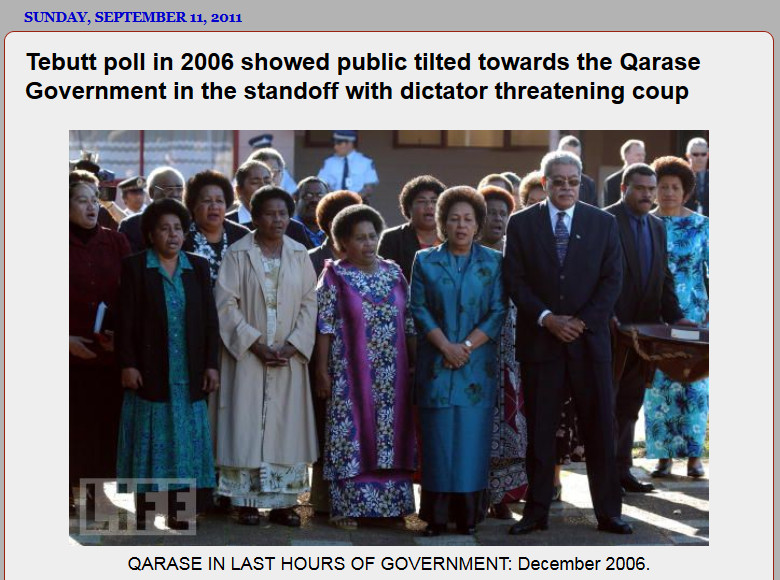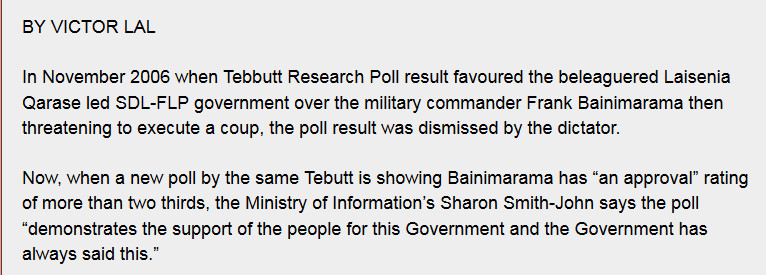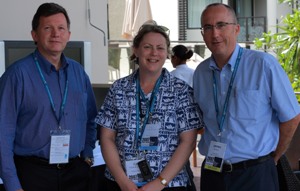THE Tebbutt Times poll on the national flag is an avenue to seek and voice people's opinion, The Fiji Times editor-in-chief, Fred Wesley said yesterday.
Attorney-General and Communications Minister, Aiyaz Sayed-Khaiyum, in a press conference yesterday, questioned the credibility of the poll, in particular, Tebbutt Research.
"Even prior to the election they (Tebbutt Research) made a number of predictions through The Fiji Times and they were incorrect and in fact, they got it completely wrong," Mr Sayed-Khaiyum said.
Of concern to him was the sample size and the manner in which the sample size was distributed.
"Obviously your ability to get a response from a sample size from landline and on mobile phone is again limited.
"How was the age determined? They (Tebbutt Research) said they talked about rural urban, what percentage of it was from the rural areas and what percentage of it was from urban?
"What were those urban and rural areas? So you see, just because a poll was published it doesn't make it necessarily correct.
"And as we know that this poll is being conducted through The Fiji Times, previously it's been proven to be wrong on a number of occasions so we take it with a pinch of salt.
"The feedback that we've been receiving is that a lot more Fijians are now engaged with the flag issue."
The minister admitted though there was a vakamalua attitude, more people were getting engaged who may necessarily not participated previously.
"So they are saying OK we don't like the 23 (new flag designs), some people are saying 'but this is the type of flag we want, can you please change it'.
"I'm sure when the submission at the end of this month closes, the Prime Minister as minister responsible, will make comments on that further more."
But Wesley said the Tebbutt research was conducted in a credible manner and that the newspaper reported its results.
"Obviously everybody is entitled to their opinion. What is also important is the fact that there are numbers to work with. There is a base for us to work from and people had an opportunity to speak their minds. Then there is the bit about stimulating discussion on the flag issue which is clearly a very important one for many people. We are not taking a side in this debate. We are merely providing an avenue for people to voice their opinions which many are doing already," said Wesley.
Tebbutt researcher, Tim Wilson said the company had been conducting polls in Fiji since 1992. "In every case the poll has been done in accordance with industry guidelines and global best practice." Source: Fiji Times, 29 June 2015
From C4/5 Archives:
The poll report stated that Bainimarama has good support from 66% of the people polled, and 65% of the people believe Fiji is heading in the right direction. An overwhelming 95% of people support the right to vote in a free election, and around half of the people feel the government is doing a good job making progress to elections. 83% of the people surveyed believe Fiji should be left alone to sort out its return to democracy, and sanctions against the country should be lifted. 96% said the right to a media free from censorship is important to them.
The opinion poll had surveyed 1,032 people.
What did the Tebbutt Poll tell dictator Bainimarama in 2006
On 17 November 2006, at the height of a dangerous standoff between army commander Bainimarama and the Qarase led multi-party government, Tebbutt was commissioned, in part, by the Fiji Times to gauge public opinion in Fiji. Polling took place via personal interviews across Fiji between 14 and15 November, with a sample of 1018 adults.
Here are some of the questions and answers:
“Who do you believe is in the right in the current standoff between the Military and the Government?”
The overall results showed 45% favouring the Government; 36% the Military; 6% both; 4% neither; others unsure. By ethnic group, 67% of Fijians favoured the Government and only 18% favoured the Military; 54% of Indo-Fijians favoured the Military and only 24% favoured the Government. By region, the Suva area was pretty evenly split: 42% Government; 38% Military. In the West, the split was 51% Government; 31% Military.
PM Laisenia Qarase had strong Fijian backing; Bainimarama did not in the poll.
The poll also asked how good a job leaders were doing. Overall, PM Qarase had 57% approval and 23% disapproval. He received 81% support from Fijians, with only 5% disapproving; Indo-Fijians showed 40% disapproval, with 34% approval.
Overall, Bainimarama had 51% approval and 31% disapproval. He received only 30% approval from Fijians, with 53% disapproving; Indo-Fijians showed 71% approval and only 12% disapproval.
Police Commissioner Andrew Hughes had public backing
Despite the dictator screaming for the resignation of Australian, Andrew Hughes (right), the Police Commissioner, Hughes received 79% approval and 7% disapproval, with all segments overwhelmingly positive. As we know, Bainimarama wanted Hughes out of Fiji because the Police Commissioner was pressing for various investigations into the dictator’s conduct since the 2000 mutiny, deaths and murders etc.
Chaudhry and Beddoes showed strong approval rating
The then Leader of Opposition Mick Beddoes also had strong figures, with overall 56% approval and 12% disapproval. FLP leader Mahendra Chaudhry had 42% approval and 27% disapproval. As expected, Chaudhry was favored by a majority of Indo-Fijians, but by only 30% of Fijians.
The Tebbutt Poll results reconfirmed the election results from May 2006: that a large majority of Fijians backed the SDL-FLP Qarase Government.
The very high approval rating for Police Commissioner Hughes was another signal to Bainimarama that at least the demand for Hughes to resign was going against the public will. The only way Bainimarama could stop various criminal charges against him was to ignore the Tebbutt Poll results, and execute a coup on 5 December 2006 to save his skin.
How should one read the two Tebbutt Opinion Polls? One was conducted in a democracy and the recent one in a dictatorship.
From the Archives: Wednesday, September 14, 2011
Polls Apart
Raw Fiji News - 14 September 2011
We’ll leave the methodology argument on the Lowy poll to Dr Wadan Narsey and others who are qualified to comment. But there’s another angle to this that has been overlooked. Consider this. If in the unlikely event that Ms Jenny Hayward-Jones, Program Director of the Myer Foundation Melanesia Program at the Lowry Institute, got her declared wish that the poll found the people of Fiji resolutely (or even slightly) opposed to the illegal regime, what then?It would not have been published – anywhere.
The military would have seen to that. And Caz Tebbutt’s business would have been targeted. Her clients would have been “counselled”, her researchers pressured to reveal, wherever possible, the identities of those who spoke against the regime. These people would have been “counselled” also. And in Frank’sFijiwe all know what that would entail. But for Ms Hayward-Jones’s and the Lowy Institute’s information there would have been beatings at the very least.
There could have been but one outcome for this poll and that alone makes it unreliable.But take into account the pervasive atmosphere of fear that exists in Fiji and it becomes impossible to conduct a meaningful poll of opinion there. Indeed, as other commentators have suggested, it’s surprising that even a few people expressed dissent.Caz has a business to run, people to employ.
And perhaps for those reasons among others she has been a public supporter of the illegal dictatorship. She’s of course entitled to hold that opinion.We do not suggest that this poll was rigged. There’s no evidence to support any such allegation and we do not believe that Caz would be party to such a device. But she didn’t have to be for the reason stated above.
When the Tebbutt-Times poll was still operating, Caz several times declined to conduct a poll on contentious issues, fearing that the powers that be would shoot the messenger. In hindsight she was probably right. She would have done better to adopt the same approach with this one.
Disclosure: Russell Hunter was editor-in-chief of the Fiji Times from 1997 to 2003 and was intimately involved in the planning of the Tebbut-Times polls.




